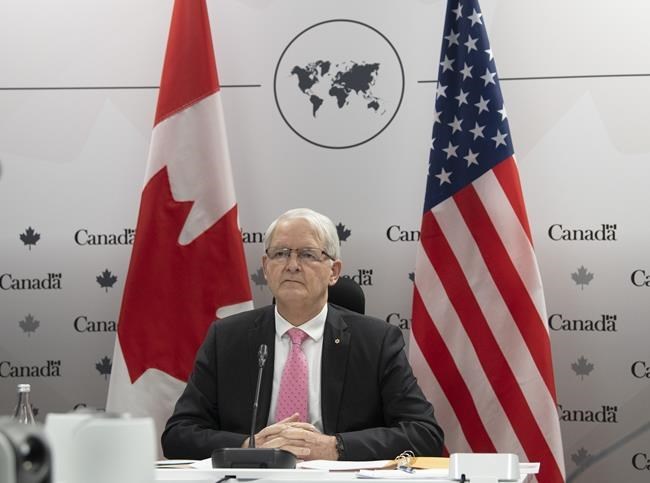Ottawa is pinning its hopes on the Kabul airport soon reopening as thousands of people with links to Canada found themselves stranded in Taliban-controlled Afghanistan on Tuesday following the overnight withdrawal of all American soldiers from the country.
Hours after the last U.S. soldier climbed aboard a military aircraft, marking the end of 20 years of Western intervention in Afghanistan, Foreign Affairs Minister Marc Garneau revealed around 1,250 Canadian citizens, permanent residents and family members are believed to have been left behind.
“The main thing that we needed to figure out was how many Canadian nationals or permanent residents and family members were able to get out on some of our allies’ flights,” Garneau said while appearing alongside Immigration Minister Marco Mendicino.
“And now that we have had a chance to look at the manifests from those other countries, we estimate that at the moment there are roughly 1,250 either Canadian citizens or permanent residents or family members that are in Afghanistan.”
A senior official speaking on background because they weren't authorized to comment on the record said the actual number of Canadian citizens still inside Afghanistan is less than 500. The U.S. says about 100 of its citizens were left behind after the last American plane departed Kabul airport.
The citizens, permanent residents and families are in addition to hundreds of former interpreters and support staff who previously supported Canada’s efforts in the country and are now clamouring to escape with their families for fear of Taliban reprisals.
The end of Western evacuation flights from Kabul has left Canadian veterans, refugee advocates and others scrambling to find alternative ways to protect those former interpreters and local staff as well as their families — including whether to have people start heading to the border with Pakistan.
The government is reaching out to Pakistan and other countries neighbouring Afghanistan to facilitate the entry of people with links to Canada, said Garneau, adding he had a phone call scheduled with Pakistan officials after the news conference.
Yet Garneau noted the government is advising against such travel, and instead emphasized Canada’s hope that U.S.-led negotiations with the Taliban would soon see the airport in Kabul reopened for people who want to leave the country.
“At the moment, our advice to Canadians and Canadian permanent residents in Afghanistan and vulnerable Afghans is to stay put, because the situation at this point is uncertain,” he said. “And obviously, we're also working on trying to get the airport open again.”
On Tuesday, Taliban spokesman Zabihullah Mujahid said technical teams are “repairing and cleaning” the airport and advised people to avoid the area for the time being.
The Taliban have said they will allow people with legal documents to travel freely, but it remains to be seen whether any commercial airlines will be willing to offer service. The Taliban are expected to hold talks with Qatar and Turkey on resuming airport operations.
“I hope you will be very cautious in dealing with the nation,” Mujahid said in a speech at the airport, addressing the Taliban fighters gathered there. “Our nation has suffered war and invasion, and the people do not have more tolerance.”
At the end of his remarks, the fighters shouted: “God is greatest!”
U.S. President Joe Biden tried to declare his own moral victory Tuesday, forcefully defending the decision to withdraw. Leaving earlier would have been just as complex and dangerous, and staying indefinitely a costly and fruitless endeavour, he said.
Indeed, Biden essentially declared that the days of the United States staging major overseas military operations in hopes of remaking a country in its own image are over.
"We saw a mission of counterterrorism in Afghanistan — getting a terrorist and stopping attacks — morph into … trying to create a democratic, cohesive and united Afghanistan, something that has never been done over many centuries of Afghan history," he said.
"Moving on from that mindset and those kinds of large-scale troop deployments will make us stronger and more effective and safer at home."
Garneau said Canada and other allies have been pushing the Taliban to allow anyone with valid travel documents to leave Afghanistan. While the Taliban have already made such a commitment, “we will judge them by their actions, not their words,” Garneau said.
The Liberal government has been repeatedly criticized for not acting fast enough to save Afghans who helped Canada during its military mission there. A special immigration program announced last month has been plagued by bureaucratic and technical problems.
Retired major-general Denis Thompson, part of a grassroots network of veterans, refugee advocates and other volunteers trying to help former interpreters, said around 80 per cent of the Afghans the network is tracking have not had their so-called SIM applications processed.
“Clear the backlog, clear the backlog of SIMs so that when the airport opens, we can get them out,” he told The Canadian Press. “That is our No. 1 priority, unequivocally.”
Mendicino defended the government’s response to date and said Canadian immigration officials are continuing to process applications as quickly as possible in the hopes people will be able to leave, even as he touted the government’s plan to accept 5,000 Afghans evacuated by the U.S.
Those Afghans are currently in third countries like Qatar, and are part of the 20,000 Afghan refugees outside the country that the government has promised to resettle. Those refugees are separate from the former interpreters and family members that are eligible for special visas.
“Our commitment is that now, even after the coalition withdrawal has been completed, we will continue to process those applications,” Mendicino said. “We will continue to express in clear and strong language that they should be permitted safe passage so they can be resettled to Canada.”
This report by The Canadian Press was first published Aug. 31, 2021.
— with files from Mike Blanchfield and The Associated Press.
Lee Berthiaume, The Canadian Press



